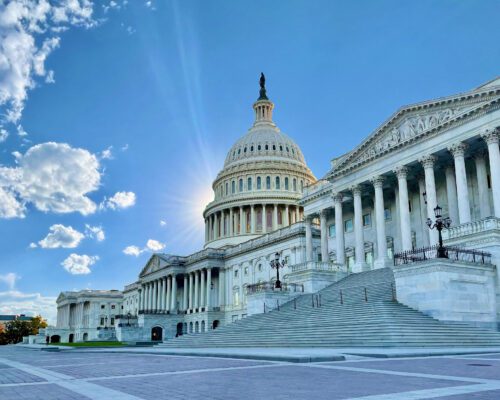Earlier this year I had the opportunity to testify before Congress for a hearing of the U.S. House Judiciary Committee. I was the sole pro-life witness called to Capitol Hill that spring day, in the weeks leading up to the reversal of Roe v. Wade. I recognized that it was my responsibly to advocate well for our cause, not only for the sake of Americans United for Life, but also because I knew I would be speaking on behalf of all American pro-life moms, dads, and families.
I knew it would be a generally hostile pro-abortion hearing, and I had to do whatever I could to focus Congress’s and the public’s attention on the reality of the humanity of the preborn child, the dignity of every mother, and the threat that is every abortion business to both mother and child.
“The future of America, a post-Roe America, is a future full of hope,” I shared in my opening statement. “Roe’s reversal will make it possible for America’s lawmakers to once more affirmatively protect the human right to life and to enshrine law and policy that makes abortion unthinkable even for those most vulnerable to abortion propaganda.”
“Abortion is fundamentally unjust,” I continued. “Abortion deprives our brothers and sisters of the equal protection of the laws. Abortion turns equals into unequals. Abortion empowers the strong at the expense of the vulnerable. And it makes us all less human and less humane along the way.”
The Role of Pregnancy Resource Centers
In June, of course, the U.S. Supreme Court finally reversed Roe and rejected its deadly abortion precedents. Although we are still only in the first months of this post-Roe America, and although we undoubtedly have many years left before we achieve the abolition of the scourge of abortion in America, we can be proud in knowing that pro-life advocates and lawmakers are making a difference in states across the country. We are recognizing, in powerful ways, the importance not only of abolishing abortion, but also of the crucial family, community, and state support for mothers and families who desire to choose life.
There’s no question that the organic growth of pro-life pregnancy resource centers across the United States over the past few decades played a major role in persuading the Supreme Court that America’s mothers and families can truly succeed without reliance upon abortion. We must continue to build upon the authentic healthcare responses of pregnancy resource centers now that we are living in this post-Roe era.
We must give our resources and time to helping centers expand their healthcare services through qualified medical providers. We must ensure that every American mother in every state and in every county has access to a high standard of care like that represented in pregnancy resource centers. And we must establish partnerships across organizations where individuals can receive whatever care they need in life-affirming, loving environments.
I knew that day on Capitol Hill that pro-abortion members of Congress would attack pregnancy resource centers. I knew the sort of falsehoods I would hear about the so-called assistance offered by Planned Parenthood and other abortion businesses. But I also knew the reality of what pregnancy resource centers provide, and the tragedies that take place every day at abortion businesses. At one point during the hearing, I was asked about the claims of Planned Parenthood and abortion businesses, and where mothers who need help can go.
“When it comes to helping mothers in difficult situations,” I said, “go ask Planned Parenthood if they provide diapers or formula or a crib or rent assistance or food or bill assistance or counseling or mammograms or continuing education and compare that to what pregnancy care centers offer and then come tell me that pro-lifers are the ones who don’t care about children.”
Who Provides Real Healthcare?
In Washington, D.C., just a stone’s throw from the halls of Congress, the Capitol Hill Pregnancy Center has been doing the rewarding work of serving mothers for years. In fact, it was one of many targeted by the pro-abortion activists from a group calling itself “Jane’s revenge.” Since the fall of Roe, pro-abortion activists have defaced, broken into, and even committed acts of arson to intimidate pregnancy resource centers. I joined the thousands of pro-life advocates who donated to the Capitol Hill Pregnancy Center in response to the attack on their mission and property this summer. They are an organic example of Washingtonians’ pro-life response to our still too pro-abortion culture, and their persistence gives me hope that we will win the hearts of Americans on the truth about abortion and pregnancy-related care.
I often hear pro-abortion activists mischaracterize pro-life protections as if they are threats to reproductive care. Yet, there is no greater threat to reproductive care than Planned Parenthood, where every pregnancy ends with a dead child and a wounded mother and father.
Those who are truly concerned about reproductive care should be stepping up to support the pregnancy resource center in their communities. It’s at our nearest pregnancy resource center that we should expect to find real reproductive care, real compassion, real options, and real healthcare.
In this post-Roe era, we look to the successes of the pregnancy resource center movement as a model to emulate. We must speak boldly and courageously about what we all really need—what every child, mother, and father deserve—and that is hope. All of our law and policy focus should be on cultivating cultural norms, nationally and in the states, that make it easier to embrace children as a part of the heroic and noble work of building up families.
Our pro-life law and policy efforts, most directly through model bills and political and legislative pushes—especially for laws that strengthen pregnancy resource centers—should build up a culture that embraces a spirit of doing even more than laws require, because to be pro-life means being pro-love. In addition, we must continue to give of our time and money in order to enable and support the expansion of existing pregnancy resource centers as they seek to provide more healthcare offerings for vulnerable women and men.
All true care, and every instance of authentic healthcare, comes, at the deepest level, as an expression of love. We care because we first choose to love. And we love by ensuring the right to life and well-being of every individual.









